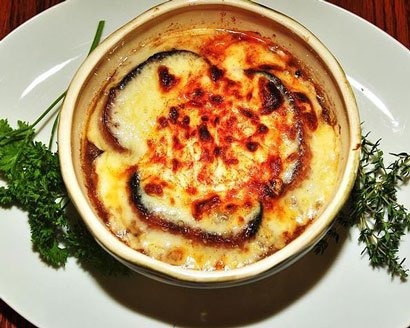The Food Almanac: Friday, March 8, 2013
Gourmet Gazetteer
Sugar Creek is a small farm town sixteen miles from downtown Indianapolis. The suburban sprawl doesn't head far in that direction however, and the fields are still covered with crops and dairy animals. The town is named for a stream of pretty good size running north-south through town. It forms a small reservoir here. Through intermediate streams its water winds up in the Ohio, then rolls all the way to New Orleans and the Gulf. The nearest place to eat is four miles in the direction of Indy, where we find Ole McDonald's Cafe. (Not the hamburger place.)
Food Calendar
It is National French Onion Soup Day. Let's make some before the cool weather ends completely. The story behind the dark, slightly sweet, aromatic onion soup, served in a crock with a cap of cheese on a floating crouton, was that it was first served in Les Halles, the gigantic marketplace that once was in the center of Paris. Like all such markets, it opened very early in the morning, and it could be cold. One of the vendors began cooking an onion soup covered with enough cheese to keep the soup from cooling quickly. The cheese would re-seal itself after every incursion of the spoon. (So it's wrong to eat the cheese first, at least if you want to be entirely traditional.) Although French onion soup lends itself to cold weather eating, it's pretty good all the time. I make a version that involves using six different onions and six different chili peppers (small ones).
Edible Dictionary
tonkatsu, Japanese, n.–A thin cutlet of pork coated with bread crumbs and deep-fried. It is very similar to panneed dishes in French and Creole cooking. The only significant difference is that the texture of the bread crumbs (which have become popular on their own under the namepanko) is different from that of western-style bread crumbs. Also, tonkatsu is usually served with a brown sauce with the flavor of reduced Worcestershire sauce. Tonkatsu is a European dish that was introduced in Japan in the late 1800s. It has become very popular, both in Japan and in American sushi bars.
The Old Kitchen Sage Sez:
Always buy one or two bunches of green onions when you're at the store, even if you don't have any explicit plans for them. Having them in hand will make you slice them up and use them somehow, and that can't help but make your meals more interesting.
Annals Of Soft Drinks
The six-bottle carton of Coca-Cola was introduced today in 1923. They cost less than the price of six bottles bought one at a time–usuallly the price of five bottles, so you got one free. The bottles themselves held seven ounces of the drink. Compare that with the refrigerator packs of Coke and other soft drinks today, which hold twenty-four cans at twelve ounces each. Ah, these are the good new days! (Or, come up with your own conclusions.)
The Saints
San Juan de Dios–Saint John of God–was born in Spain today in 1495. Today is his feast day, too. He is the patron saint of alcoholics, many of whom he cared for in a house in Granada that he ran for the sick.
Dimes In Dining
The New Orleans branch of the U.S. Mint began making its first coins–dimes–on this day in 1838. A dime could buy a lunch in those days, but there were no restaurants as we know then around to sell it to us. Antoine's would not open for another two years. Vendors in the French Market would sell you at least a dozen oysters for a dime, though. Now the best dime deal is the ten-cent martini they serve at lunch at Bacco.
Food Namesakes
Cheryl James, "Salt" in the all-girl rap act Salt 'n' Pepa, was born today in 1964. . . Pop singer Cheryl Baker got the beat today in 1954. . . Jim Rice, an outfielder who won Most Valuable Player in the American League in 1978, came to life today in 1953. . . Baseball pitcher John Butcher had a less successful career in the majors–just seven years–but that's not nothing. He was born today in 1957.
Words To Eat By
"Happy is said to be the family which can eat onions together. They are, for the time being, separate from the world, and have a harmony of aspiration."–Charles Dudley Warner, American journalist of the late 1800s.
